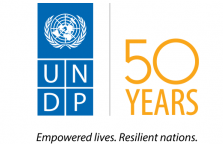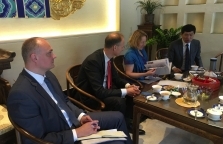On June 2, 2016, Mr. Xu Haoliang, the Assistant Secretary-General of United Nations (UN) and Director for the Regional Bureau for Asia and the Pacific at the United Nations Development Program (UNDP), expressed the collaboration will to the Chairmen of Finance Center for South-South Cooperation (FCSSC), Mr. Cai E-Sheng, during a meeting in FCSSC Beijing office. Mr. Xu proposed that “We have abundant experience in the areas of promoting South-South Cooperation and stimulating policies negotiation, which may support the work of FCSSC”.
Dr. Wu Zhong, the Direct-General of FCSSC, Ms. Agi Veres, the Country Director of UNDP in China and other related figures attended the meeting.
Chairman Cai mentioned that the ultimate aim of South-South Cooperation should be individual development oriented, and those projects we held would only become significant if they could contribute to the improvement of the lives of people in developing countries. Therefore, our work should serve broader public interest, which might require us to search for more cooperation with other platforms dedicating to South-South Cooperation. Of course the United Nation is one of the most important partners we’ve been looking for.
Dr. Wu further introduced the major functions of FCSSC. First, FCSSC dedicates in promoting international cooperation on production capacity, such as strategic consulting service for developing countries to promote industrialization, financial assistance to Chinese companies to export capacity and go abroad. For instance, during the Africa-China Poverty Reduction and Development Conference in December 2015, FCSSC signed a Memorandum of Understanding with the Abia State government of Nigeria, the Ministry of Finance of Djibouti and the Government of Senegal to facilitate economic transformation and industrialization. Within half a year, FCSSC has successfully facilitated the Djibouti government to design and construct a free trade zone, together with the Center for New Structural Economics at Peking University, the Made in Africa Initiative and China Merchants Group. Recently the four parties just made a presentation to the newly elected president of Djibouti about the SEZ’s progress. Second, FCSSC aims to facilitate South-South dialogue and exchanges by participating in key South-South events and creating South-South communication platforms. For instance, FCSSC co-organized the Silk Road Forum 2015 in Madrid and the Silk Road Forum 2016 in Warsaw, with the Development Research Center of the State Council of the People's Republic of China, so as to unite those think tanks of countries involved in the Silk Road, build up a high-end platform for promoting “One Belt One Road” and encourage the flow of commerce and communication. Third, FCSSC actively participates into the academic research on South-South Cooperation topics, such as writing an annual report on South-South Cooperation with the Center for Human and Economic Development Studies of Peking University and other world renowned academic researchers. Last but not least, FCSSC has built a deep and stable partnership with the United Nations. During the Africa-China Poverty Reduction and Development Conference, FCSSC signed a Memorandum of Understanding with the United Nations Development Program and the Made in Africa Initiative, so as to support sustainable and inclusive industrial development in Africa. Then in May, 2016, a South-South Cooperation Fund was established with joint effort of the United Nation Social Impact Fund and FCSSC. Both parties agreed to support each other and benefit from each other's strategic knowledge, expertise, resource mobilization initiatives and working procedures. Besides, the Parties recognize the benefits to be derived from increased collaboration, cooperation and interaction in the fields of private sector inclusion in the development process, social and impact M/SME development, and the mobilization of blended finance and social impact capital.
Mr. Xu commended the achievements of FCSSC and showed great interest and appreciation on the idea of the annual report on South-South Cooperation, which the UNDP hoped to participate in. As for the industrialization projects in developing countries, he thought that the mature resource network of UNDP would bring huge advantage in systematically promoting international cooperation on production capacity.
The Finance Center for South-South Cooperation and the United Nations Development Program will sign another engagement concept note based on the parties’ Memorandum of Understanding at the end of 2015. The enhanced cooperation will support the institutional building of the Made in Africa Initiative and promote China-Africa capacity cooperation, build knowledge management systems and conduct joint research to bridge information gaps, promote sustainable investment in Africa and facilitating capacity building for enterprises, as well as work with governments to build key success examples through sharing the Chinese rich experience in Special Economic Zone.
Background
The United Nations Development Program (UNDP) is the top-ranked multilateral organization in aid transparency. It is the United Nations’ global development network, headquartered in New York City. UNDP advocates for change and connects countries to knowledge, experience and resources to help people build a better life. It provides expert advice, training, and grants support to developing countries, with increasing emphasis on assistance to the least developed countries.


